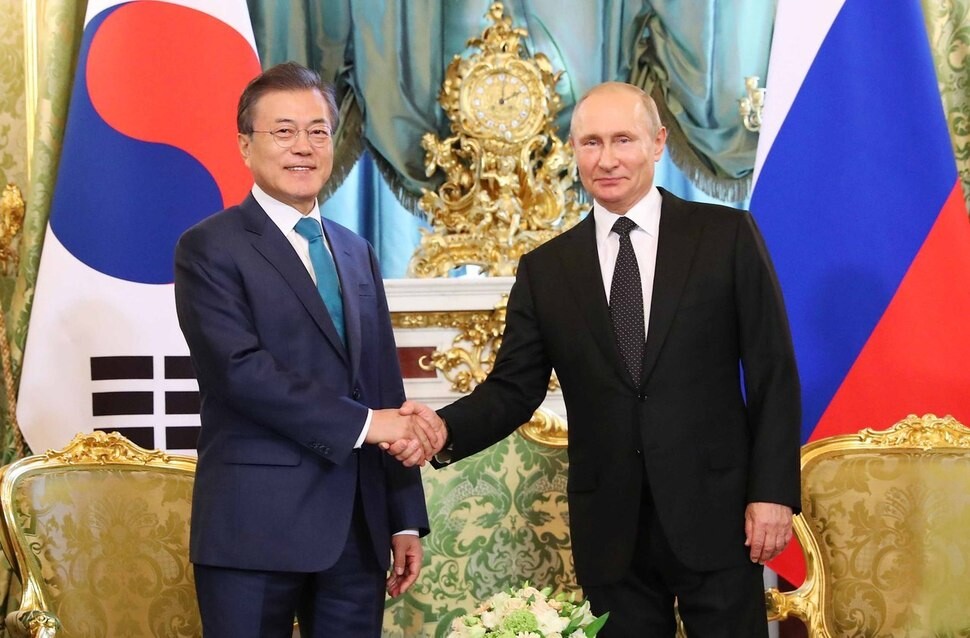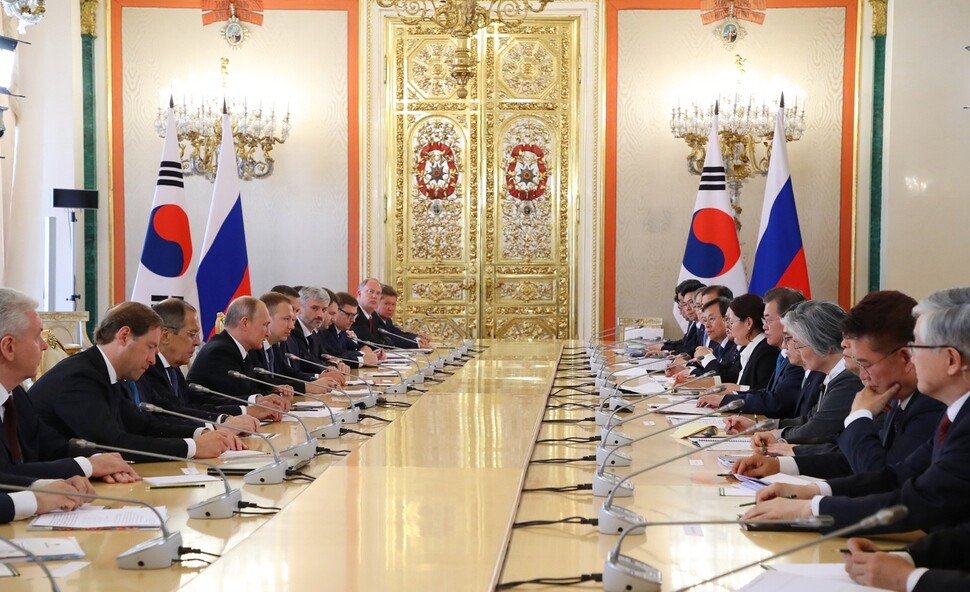hankyoreh
Links to other country sites 다른 나라 사이트 링크
[News analysis] South Korea-Russia cooperation indicative of changes on Korean Peninsula

The emphasis on economic cooperation in a June 22 summit between South Korean President Moon Jae-in and Russian President Vladimir Putin appears closely linked to rapid changes in the Korean Peninsula political situation since the June 12 North Korea-US summit in Singapore. Stressing a process leading from North Korea’s denuclearization to the lifting of sanctions and increased economic cooperation, the South Korean and Russian leaders expressed the position that the denuclearization and establishment of peace on the Korean Peninsula would ultimately be in both countries’ economic interests.
In a joint press statement following the summit that day, President Moon said the two leaders had “agreed to strengthen communication and cooperation so that the Korean Peninsula and Eurasia can prosper together.”
“We plan to diligently implement projects that South Korea and Russia can prioritize to prepare for trilateral cooperation [with North Korea],” he added.
In their summit that day, the two leaders also agreed to cooperate on a railroad project involving the shared use of the Rajin-Hasan railway to build a Eurasian network linking South Korea with Russia and Europe, while researching and cooperating on a linkage of the Trans-Siberian Railway (TSR) and a Trans-Korean Railway (TKR). While the “Rajin-Hasan project” has been halted due to Seoul’s independent sanctions against North Korea, it is seen as an effort that could potentially help all four sides – South and North Korea, China, and Russia – by functioning not only as an area of South Korea-Russia cooperation but as a distribution base for China’s northeast once it gets back on track with North Korea’s implementation of its denuclearization agreement.
Once linked, the TSR and TKR could also serve as routes for international transportation linking Europe and Asia. Analysts predicted South Korea and Russia’s agreement on June 22 could lend momentum toward an inter-Korean agreement on linking the Donghae Bukbu railway.
President Moon and Putin also agreed to initiate domestic procedures for negotiations toward a bilateral service-investment FTA. President Moon proposed “reaching the priority targets of US$30 billion in trade and one million people in human exchanges by the 30th anniversary of bilateral relations in 2020 for the sake of shared prosperity in the Eurasian era.”
The two leaders also agreed to develop an action plan to advance economic cooperation in priority areas including the “nine bridges” proposed by President Moon (natural gas, railways, seaport infrastructure, electricity, Arctic shipping routes, shipbuilding, job creation, agriculture and fisheries) in Sept. 2017.
“Once peace is established on the Korean Peninsula, a new chapter will be written in South Korea-Russia economic cooperation,” President Moon predicted in a South Korea-Russia Business Forum speech attended by businesspeople from both sides.

Russia as base in “new northern policy”
The reasons behind President Moon’s particular focus on South Korea-Russia economic cooperation include both his intent to use Russia as a key base in his “new northern policy” and his vision of using economic cooperation as a means of reinforcing a peace regime on the Korean Peninsula. As one of the parties to the Six-Party Talks and a permanent member of the UN Security Council, Russia plays an important role in Korean Peninsula issues. While those issues are ultimately between South and North Korea, they are also international in nature; by stressing that North Korea’s denuclearization will also contribute to Russia’s economic interests, Moon is attempting to bring Moscow “on board” as part of the denuclearization process.
“The trilateral economic cooperation between South and North Korea and Russia is meant to create a positive feedback loop between a Korean Peninsula peace regime and economic cooperation,” explained a key Blue House official.
Another underlying factor is Seoul’s prediction that closer economic connections with Russia could help usher it out of the potential “New Cold War” opposition between South Korea, the US, Japan on one side and North Korea, China, and Russia on the other amid up-and-down relations between Washington and Beijing.
In addition to a memorandum of understanding (MOU) on the launch of domestic procedures toward a South Korea-Russia FTA, the two leaders also signed 18 other MOU documents that day on areas including railway, health care, and science/technology cooperation.
Kim Bo-hyeop and Park Tae-woo, staff reporters
Please direct comments or questions to [english@hani.co.kr]

Editorial・opinion
![[Column] Has Korea, too, crossed the Rubicon on China? [Column] Has Korea, too, crossed the Rubicon on China?](https://flexible.img.hani.co.kr/flexible/normal/500/300/imgdb/original/2024/0419/9317135153409185.jpg) [Column] Has Korea, too, crossed the Rubicon on China?
[Column] Has Korea, too, crossed the Rubicon on China?![[Correspondent’s column] In Japan’s alliance with US, echoes of its past alliances with UK [Correspondent’s column] In Japan’s alliance with US, echoes of its past alliances with UK](https://flexible.img.hani.co.kr/flexible/normal/500/300/imgdb/original/2024/0419/2317135166563519.jpg) [Correspondent’s column] In Japan’s alliance with US, echoes of its past alliances with UK
[Correspondent’s column] In Japan’s alliance with US, echoes of its past alliances with UK- [Editorial] Does Yoon think the Korean public is wrong?
- [Editorial] As it bolsters its alliance with US, Japan must be accountable for past
- [Guest essay] Amending the Constitution is Yoon’s key to leaving office in public’s good graces
- [Editorial] 10 years on, lessons of Sewol tragedy must never be forgotten
- [Column] A death blow to Korea’s prosecutor politics
- [Correspondent’s column] The US and the end of Japanese pacifism
- [Guest essay] How Korea turned its trainee doctors into monsters
- [Guest essay] As someone who helped forge Seoul-Moscow ties, their status today troubles me
Most viewed articles
- 1[Column] The clock is ticking for Korea’s first lady
- 2Hong Se-hwa, voice for tolerance whose memoir of exile touched a chord, dies at 76
- 3After 2 months of delayed, denied medical care, Koreans worry worst may be yet to come
- 4[Column] Has Korea, too, crossed the Rubicon on China?
- 5US overtakes China as Korea’s top export market, prompting trade sanction jitters
- 6Samsung barricades office as unionized workers strike for better conditions
- 7[Correspondent’s column] In Japan’s alliance with US, echoes of its past alliances with UK
- 8All eyes on Xiaomi after it pulls off EV that Apple couldn’t
- 9[Correspondent’s column] The US and the end of Japanese pacifism
- 10[Guest essay] How Korea turned its trainee doctors into monsters